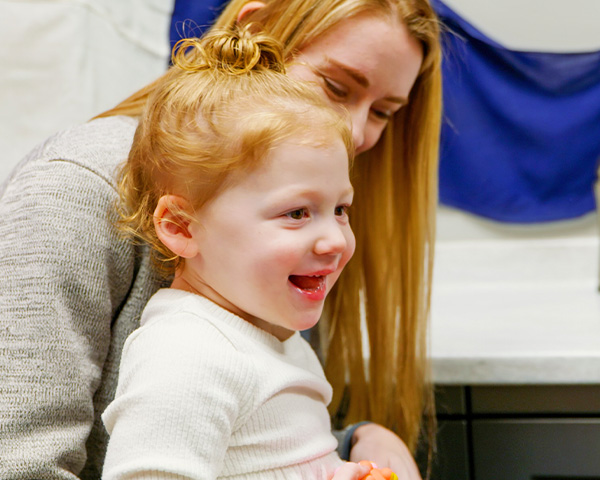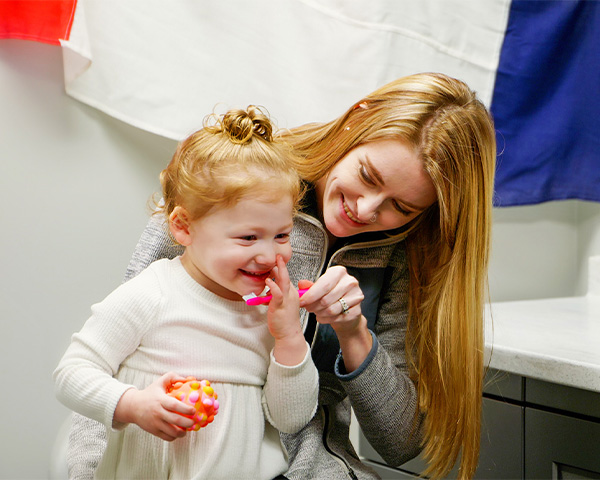How to Recognize Signs of Teething


As a parent, watching your baby grow and develop is one of life’s greatest joys. However, along with the many milestones, there are also challenging moments, such as teething. This natural process, while a sign of healthy development, can be a trying time for both you and your little one. That’s why our Saginaw pediatric dentist is here to help parents recognize how teething affects children early on so the necessary comfort and care can be provided.
Here are 5 of the most common signs of teething so you can better identify when it’s happening for your baby.
The Onset of Teething
You’ve heard it before but it’s important to remember: every baby is different. What’s considered “normal” can vary and this applies to many things, including teething. The onset of teething only begins when your child’s first tooth is in the process of erupting.
Some babies have a tooth appear around 6 months of age while others make it to their first birthday without a visible addition to their smile. However, on average, most babies start teething between 4 and 7 months. Teething symptoms during this time can be more intense or nonexistent depending on your child.
As your child’s primary teeth start to emerge, our pediatric dentist recommends that you bring them in for an infant oral health exam. This way we can gently examine their mouth and make sure there are no immediate causes for concern. We can also offer tips for soothing sore gums, how to brush before teeth, and when it’s time to teach oral hygiene habits.
Teething May Be To Blame if Your Child:
1. Cries and Acts Overly Irritable
Mood changes can signal that your baby is entering the teething phase. Crying may happen more frequently, and it might not take much to set even the happiest baby off. Don’t worry, it’s not permanent. If your baby is feeling regularly agitated it’s likely because a new tooth is pressing on and poking its way through their gums.
Their first teeth will be the most painful but as time goes on, they’ll become accustomed to what teething feels like. For upset babies, our pediatric dentist encourages parents to place something cold in your child’s mouth, i.e., a cold pacifier, spoon, or teething ring. The lower temperature will help to ease their tender gums.
2. Seems to Drool More
Babies drool quite a bit already, but when they start teething, it’s not uncommon for the drooling to increase. If you notice your baby’s shirt becoming drenched rather quickly, teething is often the culprit. Try having your child wear a bib to keep their clothes dry for longer and be sure to wipe or pat away drool so it doesn’t cause a rash on their skin.
3. Wants to Bite or Chew
When there is pressure from a tooth poking through under the gums, chewing or biting down on something can feel good. This is what your baby is trying to do if they’re teething and why teething rings or other toys are so effective.
Our pediatric dentist recommends giving your child something safe to chew on like bumpy rubber teething toys or a wet washcloth. Using a silicone finger slip toothbrush can also help to apply counter pressure and massage the gums.
4. Has Gums That Are Swollen or Tender
This is expected during teething and what babies will fuss the most about as their teeth erupt. Simply running a clean finger along your child’s irritated gums can provide them with much needed comfort and relief. Though it is tempting as a relaxation technique, try not to let your child have a bottle as they fall asleep or you risk what’s known as baby bottle tooth decay.
5. Feels Slightly Warmer
Just to be clear: any temperature over 100 or 101 degrees fahrenheit is likely not the sole result of teething. If your baby has a high fever, our pediatric dentist urges you to take them to a physician for further evaluation and care.
However, if their temperature is slightly raised and they are also exhibiting a few of the signs listed above, teething is probably the cause.
Consult With Dr. Yahn
Teething is a normal part of the oral development process but it can still throw some parents off and make them question what’s typical. Our pediatric dentist in Saginaw, MI, is here to calm your nerves and guide you through this pivotal time in your child’s life! Call Great Lakes Bay Pediatric Dentistry today at (989) 792-9201 to request an appointment or to ask any pressing questions.




